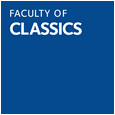Those responsible for admissions in Classical Archaeology and Ancient History will consider all the available information – past and predicted examination results, school reports, personal reports and interviews – with a view to assessing the individual candidate’s potential to benefit from the course provided by Oxford, and to assessing the candidate’s potential to be a good tutorial student, and to attain good results in examinations. The weight given to the different criteria will vary according to the individual background and circumstances of each candidate.



